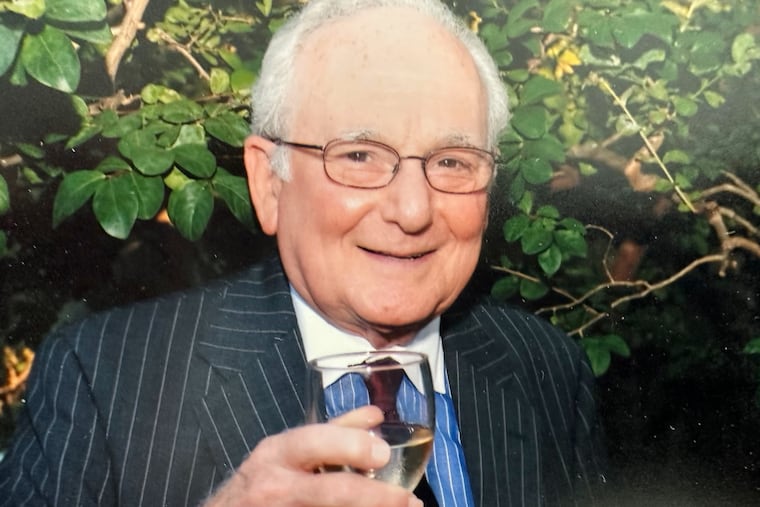Donald S. Wasserman, longtime arbitrator and labor relations expert, has died at 92
He was the chief collective bargaining negotiator at AFSCME for nearly 30 years and chairman of the Federal Labor Relations Authority in 2000.

Donald S. Wasserman, 92, formerly of Philadelphia, onetime chairman of the Federal Labor Relations Authority, longtime director of research and collective bargaining for the American Federation of State, County and Municipal Employees, and sought-after labor law expert, died Sunday, May 21, of complications from pneumonia at Sibley Memorial Hospital in Washington.
Mr. Wasserman was a champion of racial, social, and economic justice for more than 60 years, and he worked on all sides of the collective bargaining process. He was assistant to the president, chief negotiator, spokesperson, and policy maker at AFSCME from 1967 to 1995, and a member of the Federal Labor Relations Authority from 1996 to 2001. From 2002 until his retirement in 2017, he worked as a neutral arbitrator for public- and private-sector labor negotiations.
Steeped in labor law, Mr. Wasserman developed 15 principles that he said should be included in every state law regarding public-sector collective bargaining agreements. He testified often before Congress and state legislative committees about bargaining unit structure, impasse resolution procedures, civil service reform, and other labor issues.
Colleagues said he “lived a life of passion” and served as a mentor, and AFSCME membership tripled during his tenure. “I was a better labor leader because of Don Wasserman,” a former colleague said in an online tribute.
Mr. Wasserman was instrumental in creating the National and Community Service Act of 1993 and updating the Fair Labor Standards Act of 1938. “The idea is not to screw the employer,” he said in a recent online video interview. “The idea is to have a process that works to the benefit of the workers but also helps in many ways the employer.”
He directed contract negotiations, economic research, and other activities for AFSCME’s 75 councils and 3,000 local unions in Alaska, Illinois, Indiana, Iowa, Ohio, Washington, and other states. He said in the online video that he received a chilly reception from state lawmakers during his testimony before a labor committee in South Carolina but that similar officials in Washington state were open to how labor agreements could “be integrated with the civil service, not destroy the civil service system, but how the two live together and how they coordinate their activities.”
In a tribute, AFSCME officials said: “His keen analytical skills and quick wit made him a formidable adversary for many of the management representatives he faced. … He had a reputation for brilliance and effectiveness.”
President Bill Clinton nominated Mr. Wasserman to the Federal Labor Relations Authority in 1995, and he served as chairman in 2000. He was a member of many boards, councils, and committees, and active with the American Arbitration Association, and Federal Mediation and Conciliation Service.
“He had a knack for negotiations,” said his son Matt.
Donald Stanley Wasserman was born Oct. 22, 1930, in Philadelphia. He lived in South Philadelphia and graduated from Germantown High School.
He earned a bachelor’s degree in business from Temple University in 1952 and a master’s degree in industrial and labor relations from the University of Pennsylvania’s Wharton School in 1956. Before AFSCME, he worked for the U.S. Department of Labor, Communications Workers of America, and International Association of Machinists.
He served six years in the Navy during the Korean War and credited much of his zeal for social justice to the racism and injustice he experienced during that time. He met Natalie Gutman at a party, and they married in 1963.
He moved to Washington after college, and he and his wife had sons Adam and Matt. He liked to frame art, collect coins and stamps, and spend as much time as possible in art museums and sipping fine wine.
He was a Philly sports fan despite living for decades in Washington, and he returned to visit the Philadelphia Museum of Art, Reading Terminal Market, and other favorite haunts for a long weekend in 2022. “He always complained you couldn’t get a good bagel, hoagie or pretzel in Washington,” his son Matt said.
His son Adam said: “Mom and Dad instilled in us that richness for life, compassion for your fellow human beings, and an understanding that it’s not enough to recognize injustice. They showed us that you must take action to make this world a better place.”
In addition to his wife and sons, Mr. Wasserman is survived by two grandchildren and other relatives.
A celebration of his life was held June 27.
Donations in his name may be made to the Temple University Fox School of Business Don Wasserman Memorial Scholarship, Conwell Hall, 7th Floor, 1801 North Broad St., Philadelphia, Pa. 19122.